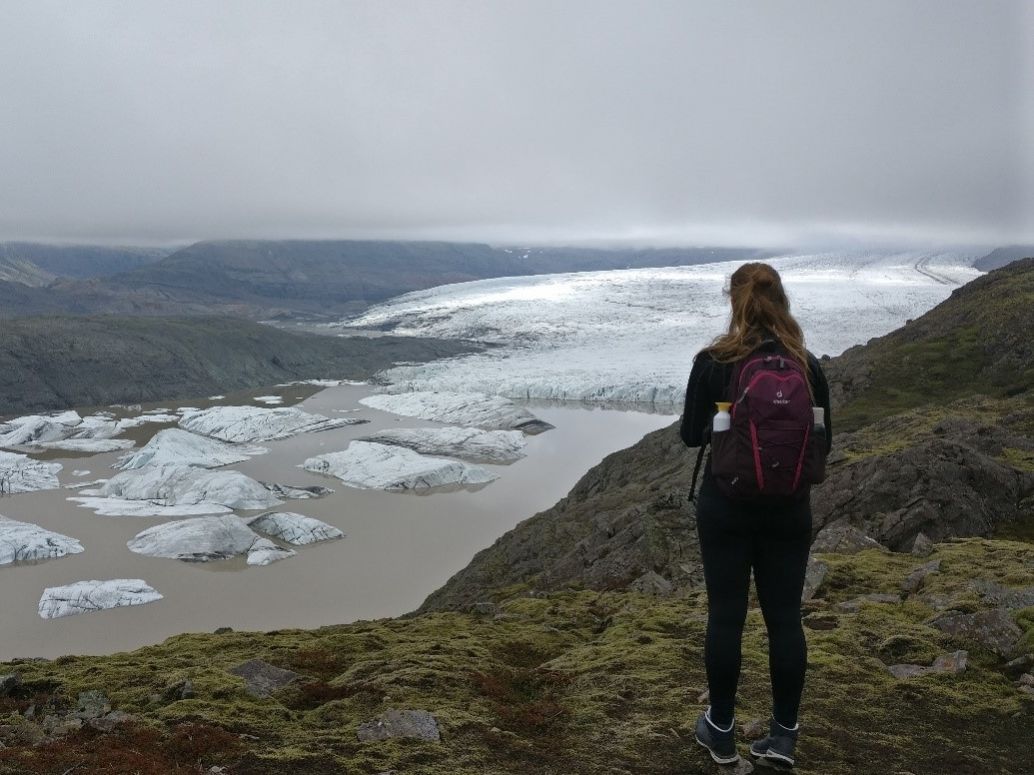Fear for the changing environment: how to turn eco-anxiety into positive action?
| Date: | 19 August 2020 |
| Author: | Erika Compatangelo |

The Sustainability Ambassadors of Campus Fryslân are a group of enthusiastic students and staff that aim to promote sustainability at our faculty. In our blogs we give updates about our activities and write about sustainability-related topics. This blog was written by Manon Eikelenboom (PhD student sustainable entrepreneurship) to open up the conversation about eco-anxiety, which is increasingly experienced among young people.
It’s a Sunday evening, tired from a day of cycling me and my partner decide to chill on the couch and watch a nature documentary. We have some snacks and the documentary provides the ultimate way to relax. However, after a while I start feeling tears burning in the corners of my eyes. Suddenly I feel this enormous sadness as I fear that these beautiful ecosystems and the animals living in them may soon disappear. A few days later I take the train to the university. I read the news, including an article about the drought in the Netherlands and, as I look outside, I see the fields around me becoming more and more yellow. My muscles start to tense, I feel anxious and hopeless as I am afraid the drought and its accompanying effects may be inevitable.
I am not alone in having these feelings of sadness, fear and hopelessness about the changing environment. Researchers have adopted terms such as eco-anxiety, climate distress and eco-fear in order to describe the psychological response to changes in the environmental and climate due to human impacts, including events such as global warming, resource depletion, and species extinction. There is no specific diagnosis of eco-anxiety but early research shows that symptoms include feelings of anxiety, loss, helplessness, frustration, obsession, burnout and depression. Eco-anxiety is mostly experienced by individuals that have lived through traumatic climate events and climate scientists that face a wealth of negative information in their work. However, eco-anxiety is also being more and more observed among younger generations. Research has indicated that children and young adults are increasingly feeling afraid, anxious and depressed due to climate change.
While eco-anxiety may lead to negative psychological responses, it can also result in positive environmental actions. Personally, I find dealing with eco-anxiety quite difficult as it can lead to a downward spiral of sadness. Research has even indicated that eco-anxiety may cause individuals to become so distressed that they are unable to act. However, there are several ways in which you can break the downward spiral and transform your eco-anxiety into positive action[1].
-
Accept and talk about your feelings. Accepting and talking about eco-anxiety is a first step you should take in order to deal with it. Personally, I find talking about my feelings related to eco-anxiety difficult as I fear people will think they are ‘too emotional’, ‘exaggerated’ or ‘unprofessional’. However, it is important to realize that these feelings are based on real problems and a logical response to the scale of the current climate crisis. Furthermore, research indicates that being more open about your emotions can assist in inspiring others to take environmental action as well.
-
Interact with like-minded people. Being able to interact with like-minded people in your community, family, education, or work is important in order to deal with negative feelings and remain positive. For me, as a PhD student in the area of sustainability, visiting sustainability conferences is very helpful. These conferences portray the positive actions that are already taken and enable me to discuss solutions with like-minded individuals. Another way in which you could interact with like-minded people is via social media. For example, I connected on LinkedIn with multiple individuals working on sustainable solutions. In this way, scrolling through my LinkedIn in the morning helps me to start the day with a positive feeling.
-
Focus on the solutions, not the problems. It is very important to educate yourself and get a good understanding about environmental problems. However, focussing too much on the problems, reading negative news over and over again, may cause a feeling of hopelessness. Therefore, it can help to focus more on the solutions, accepting that environmental problems exist but avoid seeing them as unsolvable. You can for instance cut back on your media exposure, disengage from overly negative discussions or intentionally seek out positive news on sustainable solutions. Furthermore, when interacting with others try to steer conversations towards solutions to avoid getting stuck in the problems. This does not mean that you should not be critical, but try to focus on being constructive and working towards better solutions.
-
Take (small) actions and feel happy about them. Taking actions, even small ones, can reduce eco-anxiety by bringing in a sense of personal empowerment. Think for instance about making greener life-style choices, creating awareness among others, protesting or volunteering. Also try to feel happy and content with smaller actions. For me, it often feels like anything I do is totally insignificant compared to the scale of environmental challenges. This feeling may cause individuals to ask too much of themselves, become obsessive, or stop taking action at all. Therefore, try to focus on small actions that are achievable for you and look at problems in the wider context. It is important to realize that the weight of climate change is not on your shoulders alone. Furthermore, you do not have to be perfect in order to contribute. By small individual actions you can have a positive impact and influence other people as well, resulting in collective efforts.
- Increase your connection with (local) nature. Spending more time in nature may help reduce eco-anxiety by encouraging a positive personal connection with the environment. I personally like to explore natural areas close to my home which helps me to experience and appreciate the many beautiful areas that are close to me. Getting involved in local environmental projects (such as picking up waste or building a community garden) in order to protect and nurture local green spaces can also help.
In conclusion, I feel that it is important that we realize that human health and environmental health are closely related. Feelings of eco-anxiety are based on real threats for the environment. It’s therefore not eco-anxiety that is the problem, it’s our society and the way we treat the environment that is problematic. I believe that by facing our eco-anxiety, we can take small steps together and transform our society, restoring the balance between humans and the environment.
[1] Please note that these are actions that work for me and may not work for everyone. If you experience high levels of anxiety and depression, please consider contacting a professional.
About the author

Ciao! My name is Erika and I am the Content & Data Management Specialist of Campus Fryslân. I was born and raised in Italy and have recently graduated from the MSc in Climate Adaptation Governance. I have been in charge of the blog and all its content since October 2023. My aim is to make this virtual space serve as a logbook for the Campus Fryslân community and as a welcoming introduction for all newcomers. Here, you will find stories from the people of Campus Fryslân to get a taste of what studying here is like and the exciting opportunities it comes with!

